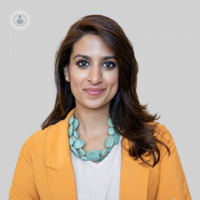A holistic approach to managing premenstrual syndrome (PMS)
Written in association with:Premenstrual syndrome (PMS) impacts many women with symptoms that can include physical discomfort, such as bloating, headaches, and cramps, as well as emotional symptoms like mood swings and irritability. For those seeking natural ways to alleviate these symptoms, a holistic approach may provide relief by focusing on the body as a whole.
We speak to a Dr Hina J. Shadid, a family doctor specialising in integrative women's health, who discusses some key components of a holistic approach to PMS, including diet, exercise, stress management, and herbal supplements.

Diet and nutrition
Eating a balanced diet is essential for reducing PMS symptoms. A focus on whole foods—such as fruits, vegetables, lean proteins, and healthy fats—helps maintain hormone balance and can reduce inflammation. Dark leafy greens, for example, are rich in magnesium, which may help reduce muscle cramps, while omega-3-rich foods like salmon and flaxseeds offer anti-inflammatory benefits.
Reducing sugar, caffeine, and salt intake can also have a noticeable impact. Sugar and caffeine can contribute to mood swings and irritability, while salt increases bloating and fluid retention. By limiting these, women can support a more stable mood and feel less physically uncomfortable.
Exercise
Regular physical activity can help manage PMS symptoms by increasing endorphin levels, which are natural chemicals in the brain that enhance mood and reduce pain. Moderate exercise such as walking, cycling, or swimming, done consistently, can boost energy and reduce stress.
Yoga, in particular, is beneficial for both physical and emotional relief from PMS. It promotes relaxation, reduces tension, and can specifically target the areas of the body most affected by PMS, such as the lower back and abdomen. Simple breathing exercises or meditation practices during yoga can also help to calm the mind and lower stress levels.
Mind-body techniques
Managing stress is crucial for alleviating mood-related PMS symptoms, such as irritability, anxiety, and depression. Techniques like mindfulness and meditation promote relaxation and allow women to become more aware of their thoughts and emotions, which can ease mood swings.
For those experiencing severe emotional symptoms, cognitive behavioural therapy (CBT) can be particularly helpful. CBT is a form of therapy that helps identify and change negative thought patterns, providing coping mechanisms for managing stress. Working with a trained therapist can offer valuable tools for emotional resilience, especially during challenging times in the menstrual cycle.
Herbal remedies
Many women find herbal remedies effective in managing PMS symptoms. Chasteberry (Vitex agnus-castus) is an herb known for its hormone-balancing properties, which may alleviate symptoms like breast tenderness and irritability. However, it’s important to consult a healthcare provider before beginning any herbal treatment, as effectiveness and safety can vary.
Magnesium and calcium supplements are also worth considering. Many women with PMS have lower levels of these minerals, and taking them may reduce symptoms such as cramps, bloating, and mood changes. As with any supplement, it is best to check with a medical professional for proper dosage and safety.
Sleep and rest
Quality sleep is essential for managing PMS, as it supports hormone regulation and emotional stability. Women experiencing PMS often suffer from disrupted sleep, which can worsen symptoms. Maintaining a regular sleep schedule and creating a restful sleep environment, free from screen time before bed, can greatly improve sleep quality.
By focusing on diet, exercise, stress management, and sleep, women can take a holistic approach to managing PMS. These practices promote overall well-being and help reduce the intensity of PMS symptoms naturally. For the best results, always consult a healthcare professional when incorporating new supplements or lifestyle changes.
If you would like to book a consultation with Dr Shadid, do not hesitate to do so by visiting her Top Doctors profile today.


